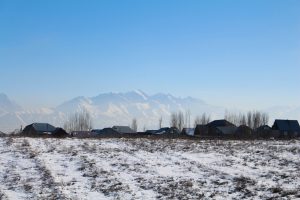 In Urumqi we learn some details about Uygur and Han relationship. For instance, the administration staff has to do a one-year internship in a Uygur village, and should bring regularly some small gifts to the welcoming family. There are also free apartments and jobs available for Han people who want to settle in Xinjiang province, and so many policemen and checking points everwhere. These policies started in 2009 when thousands of Han and Uygur fought with each other.
In Urumqi we learn some details about Uygur and Han relationship. For instance, the administration staff has to do a one-year internship in a Uygur village, and should bring regularly some small gifts to the welcoming family. There are also free apartments and jobs available for Han people who want to settle in Xinjiang province, and so many policemen and checking points everwhere. These policies started in 2009 when thousands of Han and Uygur fought with each other.
We talk about all that eating a hot pot. We’ll stay 3 nights there the time to relax and get some information from Kazakh embassy. We stop in Kuitun, where a young chinese girl helps us find a host for a few hours, without success. Finally the police drives us to the police station, but we convince them to take us back to the center after we refused some free hotels.
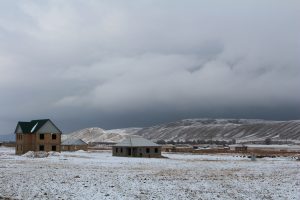 The cold wind is biting us but we finally find two nice guys who bring us to their flat. Actually they are… Policemen. We have a nice evening with local food and Wusu beer, made in a village close by.
The cold wind is biting us but we finally find two nice guys who bring us to their flat. Actually they are… Policemen. We have a nice evening with local food and Wusu beer, made in a village close by.
Next day, a young driver takes us, and then stops again for a father and his son. We cross a range of mountains with a nice view on a lake with amazing colours, with shades of green and brown mixed with the silver of ice and snow. Everything is frozen.
In Lucaogou we find a host quickly, it’s a preview of Kazakhstan. Then the border crossing is quite interesting, you have to pay a bus ticket 10 euros or you need a bicycle or a horse. We try to jump on each other shoulders, but it’s not funny… We try to force them to let us go, but after one hour fighting we finally pay.
It’s over! One month in China. And on the other side Kazakhstan is another world. Infrastructures are old, cars are from another era, and people drive mainly antiquated Audi, Mercedes, Lada and some Toyota Camri which is a brand following us for two months already. Military clothes are everywhere and faces are tough.
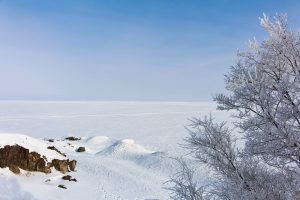 However we find our host with the first try. Arcadi is a Moldavian agronome in mission in the oblast. Not talkative but really nice, we ask him if they drink teaor coffee there in Moldavia and he replies “I drink all liquid”. No comment.
However we find our host with the first try. Arcadi is a Moldavian agronome in mission in the oblast. Not talkative but really nice, we ask him if they drink teaor coffee there in Moldavia and he replies “I drink all liquid”. No comment.
We have nice time with him, in a really cosy apartment within an ugly building.
If this first picture of Kazakhstan corresponds to the stereotype we have, the kindness of inhabitants, the comfort of their home and easy hitchhiking is contrasting with the hostility of the environment.
Our second night there we stay with a young guy, Azamat, met in a small supermarket. He talks about French history, Georges Sand and sings some Stromae songs by heart. His culture is really impressive. He earns 200 dollars per month, night work, the only salary of his family.
In Almaty we spend three nights with Madi, we cook, we visit the snowy city and we check Ouzbek and Iranian embassies. We decide to do our visas next week in Bishkek and we still have four days to visit the area. We then leace for Balkhash lake direction.
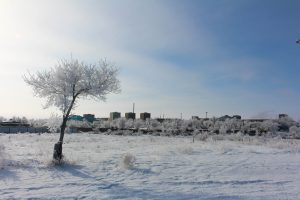 It’s infinite steppe, all frozen. The temperature falls down to -20°C by night.
It’s infinite steppe, all frozen. The temperature falls down to -20°C by night.
We sleep in a small shepherd hamlet with a family, lost in the icy landscape. With some of their friends we kill a delightful kazakh vodka, so much better than what we find in Europe. Among us is a woman local champion in weightlifting, sport quite common here with wrestling and boxing.
In the morning we leave with a gas truck, but the traffic is low. We shake in the cold. Another truck and a car finally bring us to Priosjorsk, where Morat finds us walking on the street. This 50 year-old worker hosts us in his parent’s home, we cook for him and we visit the town. It’s an old strategic military base of USSR. Kazakh army is still in the place, and we see some tanks and artillery bazaars. We also see some old Mig 21 and huge radars, impressing. All this is besides one of the biggest lake in the world, all frozen with some fishers’ sled on their way to some holes.
When we wake up the frost covers everything, trees and grass. It’s -10 but the wind makes it worse and our feet suffer from the contact with the ground. Finally, after one hour Morat helps us stop a car which brings us to Shu, in the warm South. All in all this icy detour is worth it!
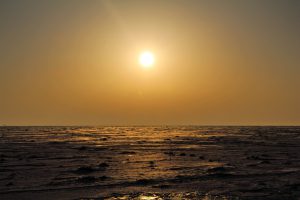 In Shu we sleep in an Orthodox church with the night guards and we also share stories quickly with a nice bearded pope. Then we go to Korday, we eat there and finally sleep in the house of the restaurant owners. Their son is really curious about our culture and way of travelling and we have nice talks with him.
In Shu we sleep in an Orthodox church with the night guards and we also share stories quickly with a nice bearded pope. Then we go to Korday, we eat there and finally sleep in the house of the restaurant owners. Their son is really curious about our culture and way of travelling and we have nice talks with him.
It’s also the time we meet our first corrupt policeman, he find a pretext to put pressure on us to give him money so we can cross the border without problems. He finally understands we’re not easy to fool.
We easily cross the border to Kyrgyzstan, which villages and roads seems really similar. If there is a difference it’s these beautiful mountains on the horizon…
But let’s talk about it in another article!

Comments